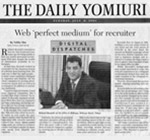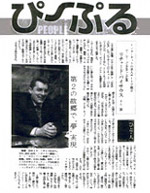CareerCross uses cookies to enhance your experience on our websites. If you continue to view our sites without changing your browser settings, then it is assumed that we have your consent to collect and utilise your cookies. If you do not want to give us your consent, then please change the cookie settings on your browser. Please refer to our privacy policy for more information.
CareerCross uses cookies to enhance your experience on our websites. If you continue to view our sites without changing your browser settings, then it is assumed that we have your consent to collect and utilise your cookies. If you do not want to give us your consent, then please change the cookie settings on your browser. Please refer to our privacy policy for more information.
Newspaper Coverage
Nippon Keizai Shinbun - 15, July 2014

Mr. Richard Bysouth: He first came to Japan in 1990 and worked for one of the largest travel agencies in Japan. In 2000, he established CareerCross, an online bilingual recruitment service.
"When I was young and working for one of Japan's largest travel agencies, I was relocated to the Shinjuku branch from my London office. I was made to hand out tissues at the square in front of Shinjuku station. Alongside newly graduated staff members, we continued to hand out tissues even when temperatures fell below zero degrees. I wondered why, after working for 2 years in the London office I was being given the same treatment as the newly graduated employees. My disappointment was enormous and I regretted having moved to Japan.
I learned the drawbacks and advantages of Japanese companies at this travel agency. I experienced that staff made 100% effort to satisfy their customers, and I realized that Japanese customer service is the best in the world. However, from a European’s point of view, useless overtime is irrational. Therefore, at my own company I put the Japanese way of the best customer service and the European way of rational ways of thinking and a sense of speed into practice. It is, so to speak, a “marriage” of Japanese and European ways.
Thinking back, I believe that experience of handing out tissues was crucial to my success. It taught to me the importance of understanding tasks from the lowest level in order to comprehend company operations well. Now as a business manager I value that point of view while managing my company."
Yomiuri Shinbun - 30, November 2008 (Japanese Only)
日本人部下に脅威感じない - 外国人管理職調査

外資系企業の外国人管理職は、日本人の部下に地位を奪われる脅威を感じていない——。外資系企業への転職サイトを運営するシー・シー・コンサルティングの調査で外国人上司のこうした意識が浮かび上がった。
調査は11月にネット上で行い、25歳以上の管理職542人が回答した。日本人の部下に対しては、「働きやすい」(52.3%)、「信頼できる」(58.3%)と肯定的な評価が多かった一方、自分のポストを脅かす存在かどうかでは、脅威を「感じない」(37.2%)、「あまり感じない」(42.1%)が計8割を占めた。
Daily Yomiuri - Tuesday, July 2004
Web "Perfect medium" for recruiter
By Tokiko Oba - Daily Yomiuri Staff Writter

Richard Bysouth remembers how he was frustrated four years ago for being unable to find any useful personnel recruitment Web-sites despite the wealth of information available in cyberspace. (read more)
At that time, Bysouth worked as a recruiter for the Japanese branch of a British head hunting firm. His task was to find the right people - in most cases candidates bilingual in Japanese and English - for his client companies by posting advertisements on job sites as well as in newspapers, in addition to screening candidates.
"I used foreign job boards. I used some Japanese companies. But I couldn’t find what I wanted" he recalled. To Bysouth , Japanese recruitment Websites were too expensive and time-consuming, and foreign services did not list enough Japanese-English bilingual job seekers.
So he thought, if he could not find any Web sites that suited his needs, he might as well create his own. This is exactly what Bysouth did in September 2000, when he launched CareerCross (www.careercross.com), an online recruitment service that targets people in Japan who speak both English and Japanese.
Currently, he serves as president and chief executive officer of Web site firm C.C. Consulting Co., Ltd. The Web site posts 1,500 to 2,000 jobs from at least 80 companies regularly, drawing about 100,000 visitors a month.
This is the latest turn in the long and winding career of the 38 year old Briton. After he quit high school, he undertook a wide variety of jobs while traveling around Europe, working as a farmer, nurse, sales-man, actor and so on, he said.
Bysouth flew to Japan in 1990, holding a one-way plane ticket in one hand and his total assets of 100,000Yen in the other hand. He opened an English-language school on his own, studied Japanese, married a Japanese woman and returned to London. He then joined a travel agency that transferred him to its Japan office in 1996.
While Bysouth’s background may sound unsettled to some, his rich job experiences in a bilingual environment helped him land the right vocation in the bilingual recruitment business.
Then he discovered the perfect match-linking recruiting with the Internet.
Bysouth believes advertising jobs online has an advantage over doing so in the print media as information can be quickly changed on the Internet. For example, he said, if a company posted a job advertisement on CareerCross, it may receive a response from good candidates on the same day. It also may cancel the posting as soon as it selects a candidate. But if it finds its advertisement is not attracting the right candidates, it can revise the ad to focus on a different group of job seekers.
"All things considered, one of the most successful e-business definitely is the recruitment business" he said. "the Internet is a perfect medium for jobs".
Yomiuri Shinbun - 26, April 2004 (Japanese Only)
ぴーぷる - 第二の故郷で”夢”実現
インターネットの求人サイトで独立
シー・シー・コンサルティング社長
リチャード・バイサウスさん 38

日本企業に就職、日本人女性と結婚して「日本が大好き」になったイギリス人のリチャード・バイサウスさんは、2000年に、インターネットを利用した求人サイト 「キャリア・クロス」を運営する会社を日本で起業した。
イギリス生まれ。高校を中退して、ヨーロッパ中を旅しながら、農業、セールスマン、看護士、俳優など様々な職業を転々としたリチャードさんが、「日本」と接点を持ったのは、今の妻、ジュンコさんと出会ったからだった。英語の勉強のために訪英中だったジュンコさんはやがて帰国。リチャードさんは寂しさから日本へやってきた。
英語を教えながら日本語を勉強して2年。イギリスに戻って結婚した。しかし、「また日本を見てみたい」と、当時勤務していた日本の旅行会社のロンドン支店から日本へ転勤させてもらったという。
「日本で子供が生まれ、いい仕事をみつけ、今や日本が故郷のような感じ。昨年末4年ぶりにイギリスに帰りましたが、外国のように感じましたよ」 やがて、イギリスの人材会社が、「日本で支店を作りたい」と、スカウトの電話をかけてきた。日本支社長として、人材紹介会社の設立に携わった。
「当時、インターネットでの求人サイトがでてきたころ。海外のサイトにはいいものがあったけど、日本人が使いやすいものはあまりなかった。これなら自分でできるのでは?と独立を考えたのです」
子供のころから、会社を作ることが夢だったというリチャードさんは、さっそくHTML(インターネット用の言語)の本を買ってきて、2000年9月、一人で会社を作った。バイリンガルの技術者、プロフェッショナル向けの求人サイトを作る決意だった。
「一人でやってるとイメージが悪いので、妻の名前を使ったりしながら朝8時から夜中の3時まで仕事をしましたよ」
やがて、右腕となるスタッフの斉藤政之さんが入社する。このため、当初の自宅から小さいレンタルオフィスを借りて、2人で仕事をした。今は、渋谷のオフィスに移転し、スタッフも10人に増えた。当初は収支トントンだったが、昨年夏くらいから売り上げは倍倍で増えているほど好調だという。
サイトは、英語と日本語で同じ情報が入っている。
「最近は、海外からの問い合わせがたくさん来ていて、1年前の2~3倍にもなる」という。海外の企業が日本人スタッフを探すために利用するニーズがあるようだ。
会社では「月曜日の朝、全員でミーティングし、全員で考える」のが、成功の要因では、と語るリチャードさん。
「英語ができるとチャンスが広がる。外国のことを理解しやすくなります。日本人にも一歩踏み出して、違う世界を見て欲しいですね」
6歳の息子ジェイミー君は「1歳からコンピューターを使い、私と同じように会社を作ってるんです。ジェイミー・ドットコムっていうんです。名刺もありますよ」。
Nikkei Sangyo Shinbun: 3, February 2004 (Japanese Only)
この人と5分間

■ 語学に堪能な人向けの転職支援サイトが好調ですね。
「『キャリアクロス』は企業がインターネットに求人広告を載せ、求職者が応募するサイトです。利用企業の九割は外資系です。 2001年9月の米同時テロ後は雇用意欲が冷え込んだ時期もありましたが、最近は採用に積極的になっています」
■ どんな職種が多いのですか。
「SE (システムエンジニア)や営業、顧客管理などの分野です。かつて日本人は雇用にブランドや安心・安全を求めていました。ただ、 最近はどんな仕事ができるかで企業を選ぶ傾向が強まっていると感じます」
■ 転職志望者にアドバイスを。
「まずスキルを磨くこと。早期退職制度などを利用する四十 - 五十代が増えていますが、プロフェッショナルとしてのスキルがないと転職は難しい。
そのうえで自身を持つこと。日本人は自分の可能性を信じられない人が多い。もっとポジティブな思考を持てば道は開けると思います」
The Japan Times 27 March
"Be a bigger cog in a smaller wheel"
Author: By SHINICHI TERADA

Richard Bysouth has some surprising career advice for Japanese businesspeople pining for the traditional panacea of employment with a major corporation: "Try choosing smaller companies." He says it can be far more rewarding to be "a big cog in a smaller company." That’s not all.
The president of CareerCross, a burgeoning bilingual online recruitment firm, says opportunities abound for bilingual Japanese and non Japanese job seekers alike due to a surge in the number of overseas companies drawn to Japan.
"The number of foreign affiliated companies in Japan has risen from about 2,700 to 4,400 over the past 10 years," says Bysouth, 40. "The number of job openings at foreign affiliated companies now surpass that of job candidates."
Bilingual specialists with international experience are in high demand.
Many jobs require candidates who understand traditional Japanese and the global market. This is especially true of the IT (information technology) sector, which has been re-energized by the growth of broadband.
There is a dearth of English-speaking Japanese engineers adept in programming, such as enterprise resource planning (ERP), customer relations management (CRM) and search engine marketing (SEM), according to Bysouth.
So much, in fact, "the head offices of overseas firms must send such professionals with translators to their Japan offices," he says.
Despite local convention, Bysouth doesn’t frown on doing a little job-hopping to find one’s niche. It worked for him. His resume ranges from farmer, nurse and salesperson after quitting high school and traveling around Europe, to CEO for a mojor recruiter in Japan.
"I’m a risk-taker," he says. "I get bored easily and like to keep moving forward."
In doing so, he amassed an array of experience, much of which went into building CareerCross.
Bysouth first came to Japan in 1990 with a one-way ticket and just $855. He left his native England to visit his future Japanese wife who he met in London.
It wasn’t long before he had opened an English-language school. The two married and later returned to London, but Japan hadn’t heard the last of the entrepreneur.
In London, he took a job with Highest International Standards(H.I.S.), Japan’s famed discount travel agency. By 1996, Bysouth had returned to Japan with his family to work at one of the company’s local offices.
He landed his first job as a recruiter in 1998. A year later, he was CEO for the Japanese operations of the British headhunting firm Robert Walters. At that time, the Internet industry was just starting to boom and Bysouth kept moving forward.
As a recruiter, his primary task was scouting qualified bilingual staff for client companies. He used newspapers and various job Web sites, painfully aware that none of the online services at the time met the growing need to match English- and Japanese-speaking bilingual job seekers with companies. He decided to do something about it.
In September 2000, he launched CareerCross (www.careercross.com), an online recruitment service that targets bilingual job seekers. The Web site now posts more that 4,000 jobs from some 150 companies and draws several hundred thousand visitors monthly.
After all his experiences and travels, Bysouth, a father of three, seems determined to remain settled in Japan. But he advocates travel abroad for bilingual Japanese interested in tapping what foreign affiliated companies in Japan have to offer.
He says it can help them attune to Western concepts, such as thinking outside the box - an asset these companies look for in applicants.
"Such Western thinking includes an ability to take responsibility for moving things forward. It helps you make better judgments based on a wide range of knowledge, " Bysouth explains.
"In a foreign country, renting an apartment, buying things at a supermarket and opening a bank account all help you understand a foreign culture. This gives you a basic idea of the business identity(of companies based in that country) and helps you understand how they get their business done."
It remains to be seen whether his current role will end his long journey of self discovery. But Bysouth is clear about his goals: continue establishing the bilingual recruitment business while contributing to society with the right job.